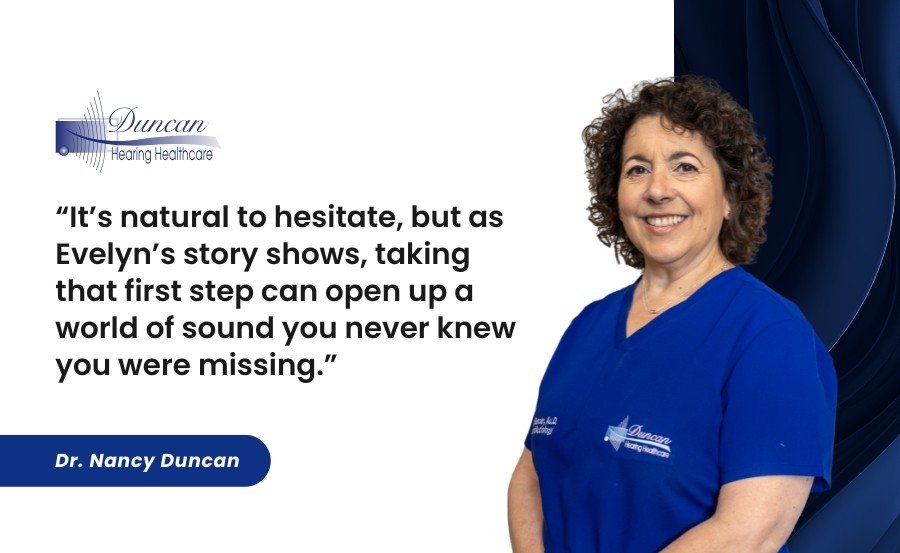Sep 13, 2022
|
Nancy Duncan, Au.D.
How Do Prescription Hearing Aids Compare To Over-The-Counter Devices?
Recently, President Biden introduced an executive order that allows Americans to access over-the-counter (OTC) hearing devices more easily.
This is excellent news for some but confusing for others.
Those who are just starting to experience a hearing loss now have many more options available to them. But does this order help people or just create doubt and misinformation?
To easily compare the difference between traditional hearing aids and over-the-counter hearing aids, the regulations use the terminology “Prescription Hearing Aids” to describe the medical-grade hearing devices that you and I know to be hearing aids.
Although aimed at simplifying the matter, it has added a layer of confusion. This has resulted in more people being unsure of the differences and which option suits their needs.
In this article, I will share the differences to ensure that you can make the right decision based on your needs.
Are Prescription Hearing Aids New?
Prescription hearing aids have become a new term in the hearing industry, but not a new product. Over-the-counter devices and online devices that can be purchased by the consumer and then self-fit is very different than prescription hearing aids.
Adding that terminology of “prescription” designates the importance that devices fit by a hearing care professional are done so based on a prescription formula. This is based on the person's individual hearing loss and other factors surrounding that patient's hearing habits.
It's a term that has been introduced to let the consumer know what the difference is.
What Is A Prescription Hearing Aid?
Prescription hearing aids are very adjustable based on a person's experience. This is so important because hearing is not a one-size-fits-all type of problem.
Hearing is very much perceptual. Two people with the same hearing loss could look at the television and decide to set the volume very, very differently. It's more of a preference thing.
We can customize prescription hearing aids for that person and take into account all the situations they face day in and day out.
What Is An Over-The-Counter Device?
Over-the-counter devices fall primarily on the consumer. They must make adjustments themselves within their app and also have to ensure they get the proper fit so they don’t fall out or get damaged.
Furthermore, over-the-counter hearing devices are not designed for hearing losses greater than a moderate level hearing loss. If somebody has a more significant hearing loss, they're going to be feeling like they're not hearing as well.
It's no different than when somebody's at the beginning stages of needing eyeglasses, where they might not need a prescription, but they might need readers.
They may have a hearing loss that's greater than the fitting range for an over-the-counter device, and so they need something more powerful and stronger.
https://duncanhearing.com/wp-content/uploads/2021/06/Duncan-OTC-blog-CTA-Banner.jpg
Hearing Tests Are Essential
OTC devices do not require a hearing test to buy one. However, we strongly recommend you do so anyway. We want to rule out anything that’s more threatening healthwise.
You could have an acoustic neuroma, which is a space-occupying growth in the ear that can cause a hearing loss on one side. You can have other diseases of the ear. So, it's important, no matter which line of defense you're going for, that you have that first audiological evaluation.
From there, your provider should be able to help you answer that question, "Do I need a prescription?" versus, "Could I get by right now with over-the-counter devices and then down the road go to prescription devices?"
So I would say, for any consumer considering either option, start with that test first. And, if you're seeing someone reputable, they will be able to tell you which option is best for you and be truthful about that because that's so important.
And, if you're feeling confused, and if you're not sure what to do, then do your research. Reach out to a hearing care professional, have that appointment, have that test, and then ask all of your questions and make sure that you feel comfortable with your decision.
With hearing healthcare, half the battle is just feeling comfortable and confident with what you're working with. If you can get those questions answered honestly and do your research, you can always reach out online and find helpful resources on our website by clicking here.
You can always email me directly at [email protected] and I'd be happy to help try to clarify things further and provide you with information.
The first step is just looking for help knowing that you have a problem because that's what we want – to make sure you are optimizing and maximizing what you have to work with for your ears.
The sooner you do that, the better, the more long-term success you'll have, and the better your system will be – your cognition, your ability to hear, your ability to use devices successfully down the road.
Really hinge on the sooner, the better. As soon as you notice you have an issue, just start looking into it. That's going to be half the battle.
What Steps Should I Take Next?
I would hope that the first step would be a hearing test – a full audiological evaluation performed by us so that we can find out what's going on with the ear.
We do not want somebody getting over-the-counter devices who may have a hearing loss that can be dealt with medically.
It could be something like wax in the ear or fluid in the ear, or perhaps there's a problem with the bones of the middle ear where it's something that they can fix medically and may restore someone's hearing.
You can schedule your test online or give us a call. We are always standing by to help.









